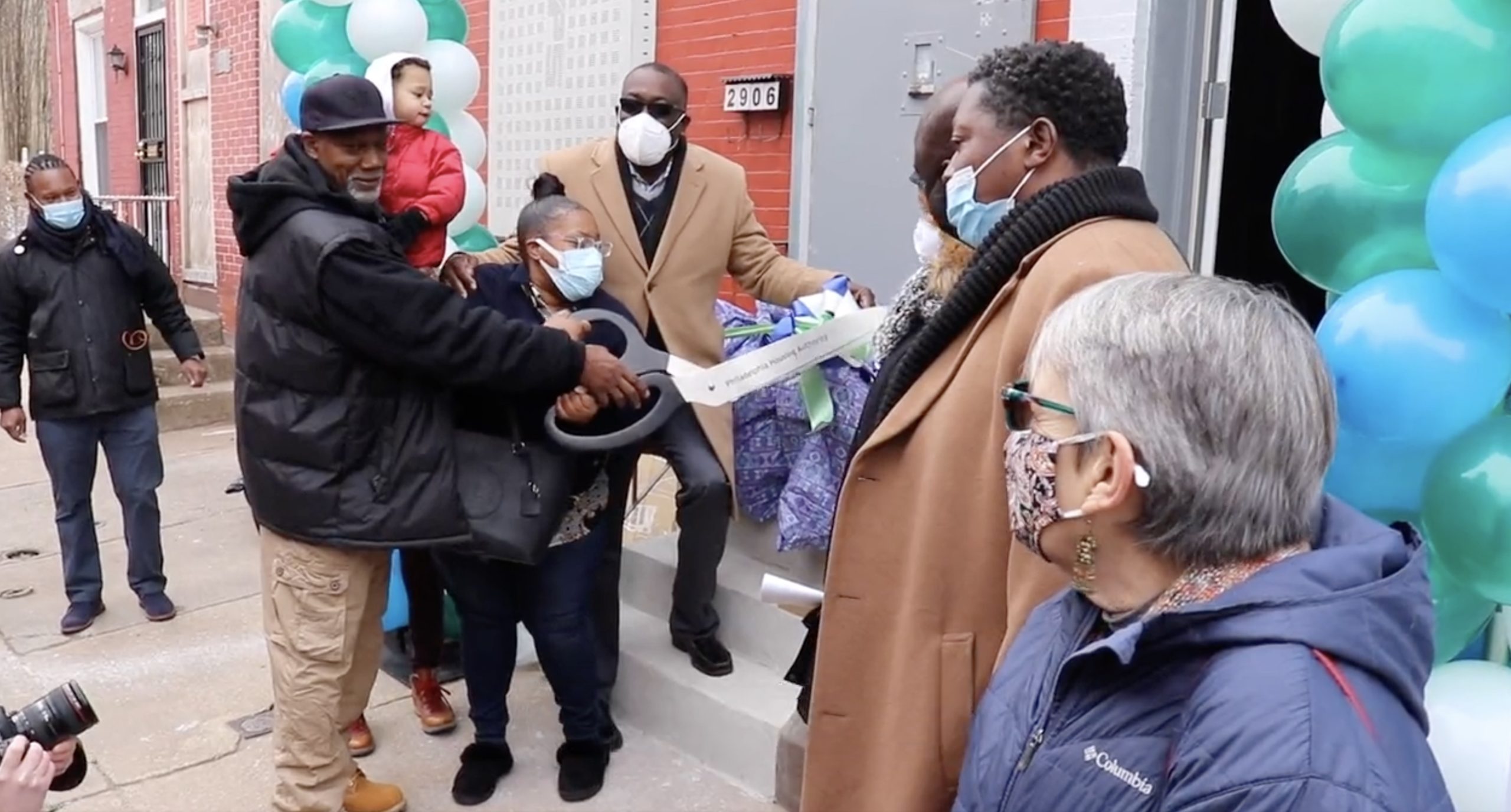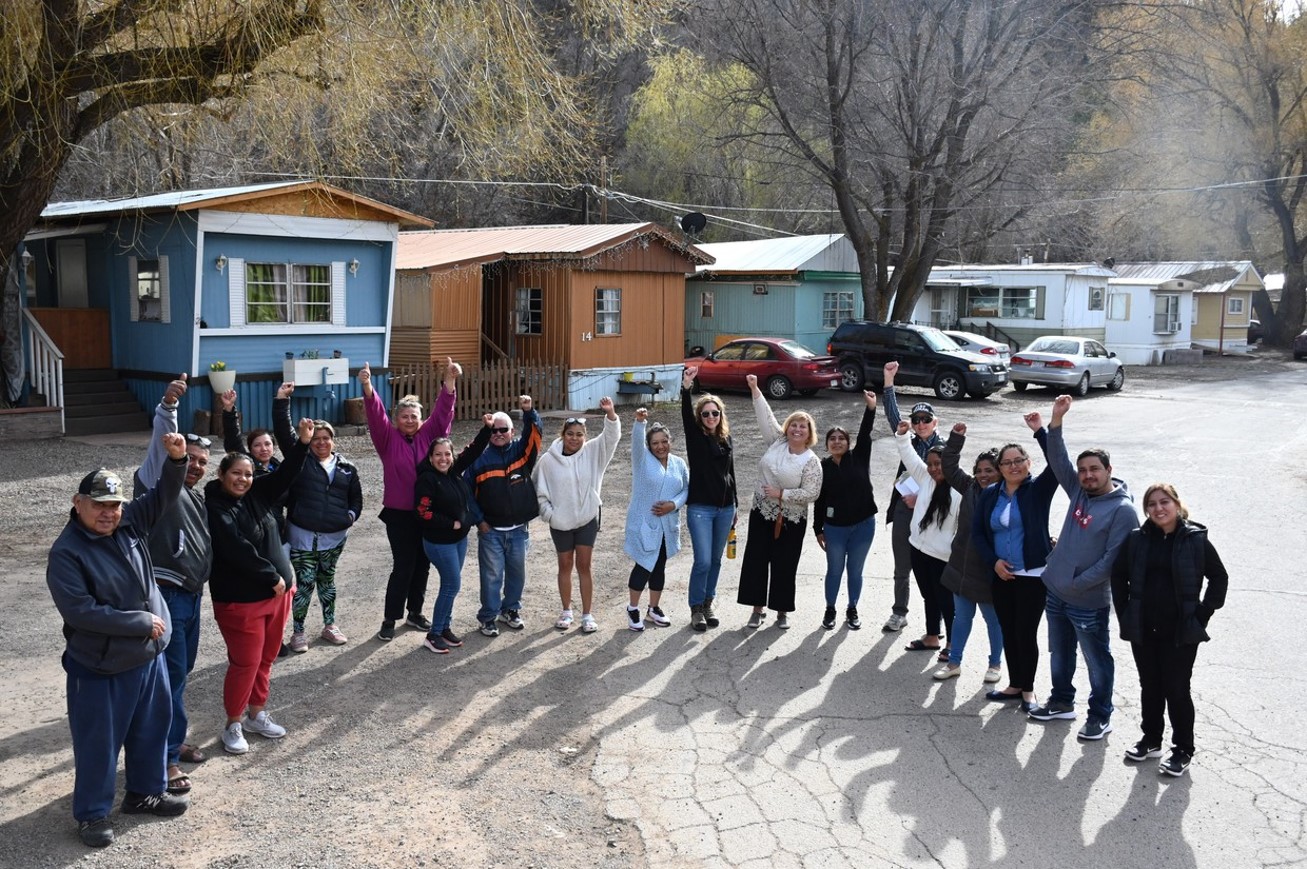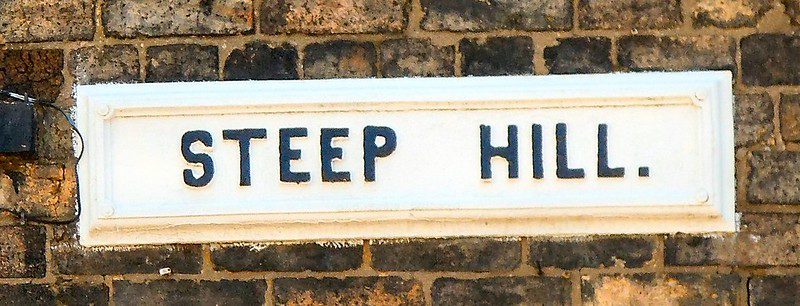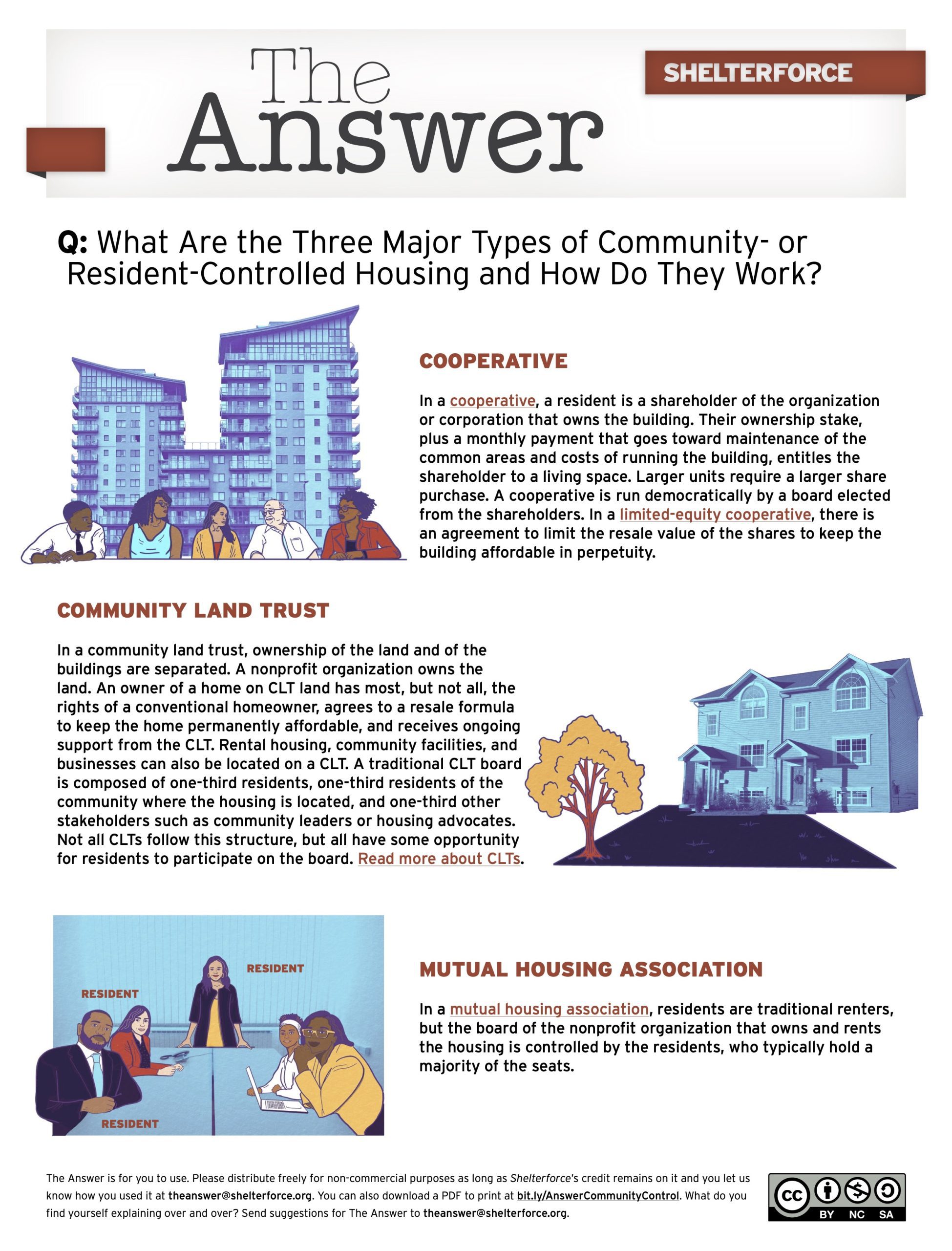A ribbon-cutting for two newly renovated rowhomes on Westmont Street in North Philadelphia last December marked a victory for local homeless activists. It had been over a year since city officials agreed to give them dozens of vacant buildings to house homeless people, and on that December day, families were finally moving in, and the properties were being handed over to the newly established Philadelphia Community Land Trust.
“It’s a blessing,” said Paul Nowell, one of the new residents. “You pray, and God, he hears your prayers.”
Turning conflict into collaboration. That’s how a community advocate describes the partnership between PHA and homeless advocates that resulted in 7 formerly homeless families celebrating Homes for the Holidays. Check out the event highlights here. pic.twitter.com/V8C8VV0AhI
— Philadelphia Housing Authority (@PhilaHsgAuthPHA) December 23, 2021
Key participants in the negotiations were on hand to celebrate the move-ins, including the city’s managing director and the CEO of the Philadelphia Housing Authority (PHA). Yet one of the most important players was absent: Jennifer Bennetch, the outspoken activist and homeless encampment organizer whose years of dogged advocacy had led to this moment.
Bennetch had spent the last few weeks raising money, getting insurance for the homes, and preparing for the transfers, but was too sick from the lingering effects of a COVID infection to attend the celebration.
“I have been quietly dealing with the bureaucracy behind the scenes while my own life is also falling apart,” she’d written in a GoFundMe fundraising appeal a few weeks earlier. “I was deathly ill over the summer and am still healing. Please help us house individuals who don’t qualify for typical housing programs in a non-restrictive private home.”
The 36-year-old Bennetch died two months later, leaving behind three children and a grieving community of friends, admirers, and fellow activists. “That was hard,” says Ruth Birchett, a Philadelphia Community Land Trust (PCLT) board member and longtime affordable housing advocate. “Jenn was like my daughter, and just going through her sickness and then planning her funeral—it was horrible for all of us.”
In the months that followed, Birchett and other board members got fully up to speed on the various demands of running the land trust, some of which Bennetch had been handling personally: fundraising, strategic planning, establishing nonprofit status, negotiating with the PHA to receive additional homes, and pressuring the city of Philadelphia, which they feared might be reneging on a separate agreement to give the trust many more properties.
Birchett emphasized that PCLT has always been a collective effort. But she also said Bennetch was a uniquely driven leader, the “go-to girl” for the trust and the larger movement it is part of. “We all couldn’t keep up with her if we had skates on,” Birchett says, with a laugh. Board member and community organizer Dan Moffat says Bennetch was the only person who had a hand in every part of the work, as became clear after her death.
“She would not always consult with all of us about what she was doing with the land trust. Picking it up, there was a little bit of, ‘OK, where are we at?’ We were not part of that process with her, like the details about the [land trust] legal entity,” he says. “Her passing was very disruptive, in our lives and also in this process. It did skip a few beats while we were putting her in the ground.”
The group is now working to realize Bennetch’s vision of a sprawling, independent housing cooperative, operated and occupied by formerly homeless people as an alternative to what she saw as the controlling or even coercive shelter options provided by government and foundation-funded organizations. PCLT board members have a major undertaking ahead as they try to ensure that the Philadelphia Housing Authority and city live up to their promises. They need to gain control of several dozen more vacant homes and find substantial funds to rehabilitate and maintain the units, while working not to stray from Bennetch’s ideals.
They continue to hope, as she did, that their organization inspires a larger movement of collectively owned, permanently affordable housing that operates outside of the current piecemeal system of tax breaks, subsidies, inclusionary zoning programs, time-limited HUD contracts, and other efforts to influence the private market.
“We’re trying to operate from this place and honor the work that was done, where it’s like, no, at a certain point, we need to take housing off of the market and administer it as a community,” Moffat says. “That’s the way that you actually start to deal with the housing crisis.”
Escalating Protests
Bennetch’s aversion to conventional public housing and her fierce dedication to the idea of a land trust stemmed from her personal experiences with welfare systems. As a girl she lived in foster care, according to Moffat, and after aging out she was homeless for seven years. She was acutely aware of the inadequacy of housing options for people with little or no income.
By 2016 she was taking college classes and living with her family in North Philadelphia, next door to PHA-owned properties. After a series of run-ins with the authority’s in-house police force she began investigating the PHA, attending board meetings, and insistently demanding policy changes. She started OccupyPHA and called for the authority to change the markings on officers’ uniforms and vehicles, so that people would understand they were not city police.
As she learned more about the PHA, she began to see it as a force for gentrification and displacement rather than for addressing the city’s shortage of deeply affordable homes. Driving around her neighborhood, she constantly noticed vacant PHA properties and kept a list that soon ran to hundreds of addresses. She saw the authority auctioning off properties that could have housed low-income Black Philadelphians but instead ended up redeveloped into housing for Temple University students and other market-rate tenants.
The PHA said it needed to sell older properties to raise badly needed funds for new construction and capital projects, but she was not convinced.
In April 2019 Bennetch and a friend set up tents outside the PHA’s new, $45 million headquarters in North Philadelphia. Their protest had several targets, including the authority’s Sharswood Blumberg Choice Neighborhoods Transformation Plan, a $500 million development program that involved taking nearly 1,300 properties by eminent domain. Bennetch also demanded that the PHA follow the required civil court process when it wants to evict squatters, rather than using its police force to simply kick people out.
The small camp was cleared after 42 days, but Bennetch and her comrades were just getting started.
The onset of the pandemic intensified Philadelphia’s homeless crisis, with several dozen people sleeping outdoors around Center City. In March 2020 Bennetch and other activists moved about 50 people into 12 vacant PHA properties, and in June they helped set up a highly visible, 150-person tent encampment—Camp JTD—on a ballfield along a major downtown thoroughfare. She later set up a smaller encampment, Camp Teddy, on a lot designated for the Sharswood project, and protested outside the home of PHA CEO Kelvin Jeremiah.
For four months Bennetch and other movement leaders engaged in often contentious negotiations with city and PHA officials. The city set dates to clear the encampments three times, only to repeatedly hold off. In October, as winter approached and the PHA faced a critical deadline to break ground on the Sharswood site, the two sides finally reached an agreement that called for the land trust to receive 59 homes.
In exchange for the closing of Camp Teddy, the PHA would give the trust nine properties on Westmont Street, including the home Paul Nowell’s family would later move into. As part of the Camp JTD closure the authority agreed to eventually hand over another 25 houses from closed Rental Assistance Demonstration, or RAD, transactions, for a total of 34 PHA properties. Separately, the city promised to provide 25 properties from its land bank and other departments.
There were other commitments as well: PHA funding of the first 7 building rehabs, about 14 spots in newly rehabbed Shared Housing units, and construction job training for encampment residents. Separately, the city moved 50 homeless individuals into a rapid-rehousing program, which has since grown to 239 participants, and announced plans to build two tiny home villages.
The deals were highly controversial among homeless activists and encampment residents, some of whom suddenly found themselves back on the street. Many thought the agreement gave Mayor Jim Kenney, the PHA, and homeless-services officials good press in exchange for not doing much, especially in the short term. Some expressed doubts that the promised housing units would ever materialize. Bennetch reportedly maintained that the nine-home Camp Teddy deal was a good one, but came to regret the bigger Camp JTD agreement.
“At the time, I didn’t realize how bad that deal was,” she later told a reporter for Philadelphia Magazine. “I don’t know if I would do that again.”
Earning Respect
One of Bennetch’s most consequential accomplishments may have been the respect she and the land trust won from the PHA’s top brass.
While they had initially dismissed her during board meetings and sent police to clear her protests, the authority did eventually change officers’ uniforms and cars and make the police complaint process more transparent, as she had demanded. “Kelvin Jeremiah said it to me—he saw that what she was requesting and what she was bringing forward is something that they hadn’t thought about, and it really made sense,” Birchett says.
"The passing of Jennifer Bennetch truly saddened the Philadelphia Housing Authority. She was a relentless advocate for affordable housing and a fearless champion for the populations we serve." – PHA CEO Kelvin A. Jeremiah.
Photo credit: WHYY pic.twitter.com/NmXxVvriLI
— Philadelphia Housing Authority (@PhilaHsgAuthPHA) February 18, 2022
While Jeremiah called for closure of the encampments, he also praised the protesters, saying they were doing “a masterful job” of raising awareness of the need for more affordable housing. When negotiations broke down, he quietly reached out to Bennetch to offer the homes for the land trust.
Jeremiah and the PHA’s attorney even established something like a friendship with Bennetch, according to Birchett and Moffat. Jeremiah did not respond to interview requests, but Birchett says the officials sent Bennetch special food when she was ill, eulogized her after she died, and kept in touch to see how her family was doing.
“They have reached out to me on a number of occasions just to check in about the children, and to reinforce the fact that they are committed to doing everything they said that they’re going to do,” Birchett says. “They have engaged with the land trust, because they want it to succeed and they want to keep their word.”
With the help of donated union labor, including apprentices recruited from the encampments, the PHA moved ahead with renovations of seven of the nine Westmont Street homes. The authority transferred two to the trust last fall and began moving the others through a HUD review process for disposition.
Before her passing Bennetch was also working to identify the other properties for transfer, with mixed success. Moffat says the PHA worked with her to pull together a list of 25 suitable authority-owned units, but the city was less helpful in identifying the 25 homes it had committed to transfer. City employees took her on several tours of properties, but she found that many were actually vacant lots; others were occupied. She saw a few that might be worth transferring, but she thought the city was operating in bad faith and the process was a waste of her time, according to Moffat. Her communication with city officials stalled and broke down.
On the day of the Westmont Street ribbon-cutting, Bennetch responded angrily to comments from the city’s Homeless Services Director Liz Hersh, who had touted Philadelphia’s efforts to assist homeless people. “The city is lying,” Bennetch wrote on GoFundMe. “They have not delivered, and stopped communicating in February after taking us to a bunch of houses they did not even own.”
Hersh refused an interview request, but the city admitted in an email that the initial property list was inaccurate. Staff subsequently began taking more care to vet properties before offering them to PCLT, according to a city spokesperson. “The lists were presented in good faith and the city remains committed to working with the trust to fulfill the goals of the agreement,” the spokesperson said in an email.
Philosophical Struggles at PCLT
The October 2020 agreement envisioned PCLT obtaining most of the properties within six months. In retrospect that timeline was unrealistic, due both to the city’s foot-dragging and PCLT’s need to build its organizational capacity, the board members say.
They contrast themselves to the Moms 4 Housing activists in Oakland, California, who worked with a long-established organization, OakCLT, to acquire a single home they were occupying.
“That was not infrastructure that needed to be built,” Moffat says, referring to the Oakland group. “I’ve talked to them, and it took them years to put the organization together, to be in a position to step in and do that. That’s the work that we’re continuing.”
He notes that Philadelphia officials included a clause in the agreement requiring Bennetch to purchase insurance for the homes—which, in turn, required fundraising—before PCLT could accept them. “You could make the argument that they were setting her up to fail and never had any real intention of fulfilling their end of the bargain,” he says.
The activists have also struggled with philosophical objections to creating a formal corporate structure. “Jenn was very suspicious of being a nonprofit, and never was comfortable with it to her last days. She always talked about trying to maybe make it an LLC or something like that,” Moffat says. She eventually gave in so the trust could accept properties without accumulating tax bills, which could burden the tenants or force PCLT to depend too much on government or foundation grants.
“Jenn was very focused on self-reliance and self-help, as a person who herself was in that situation and wanted to see people do better for themselves. She was very careful to avoid creating a situation of dependence and institutionalization,” Moffat says.
Given that PCLT may need millions of dollars over the next few years to renovate its properties, some of them dilapidated and unoccupied for decades, the board members say they are actively looking for donors and have gotten certification to accept housing vouchers. Moffat says he’s looking forward to hiring permanent staff, while Birchett argues the city should also help fund the organization, despite Bennetch’s skepticism about such assistance.
“There are certain things where, if Jenn was alive today, she would probably be yelling at us about how we’re trying to go about it,” Moffat says. “Maybe the reality is that there is not a great model for community ownership that exists in the law today. That is maybe work that has yet to be done by the broader social justice housing movement to come up with and articulate and enact.”
The larger PCLT community continues to engage in other housing activism. Some of those who organized the encampments are now fighting to save the UC Townhomes, an affordable complex in West Philadelphia that is slated to be sold. They also continue to defend families who are squatting in vacant PHA properties; earlier this year, when police were trying to evict two households who lived in units near the authority’s headquarters, activists intervened and PHA helped the families find other housing, Moffat says.
‘If they think because Jennifer Bennetch is no longer with us that they’re off the hook, they got another thought coming. Because we still got tents.’
Advocates for the homeless are also watching warily as the city slowly advances plans for its first tiny home villages. Moffat and Birchett are dismissive of the plans, saying Bennetch scorned tiny homes as poor substitutes for regular housing. One of the communities will apparently be a complex of mid-size apartments for seniors in West Philadelphia; the other will be reserved for older women and consist of 120-square-foot pods on city land in North Philadelphia. It is unclear when construction will begin.
[RELATED ARTICLE: Are Tiny Homes a Piece of the Affordable Housing Puzzle?]
But one of the land trust’s main focuses these days is holding the city accountable to its promise to transfer 25 properties. Birchett says Bennetch was last shown properties in January 2021, and efforts to meet with city officials this past summer did not go anywhere. Moffat finally met with them at the end of September and discussed how to get the transfers going before Mayor Kenney leaves office at the end of 2023. But he said he was disappointed that the officials showed up without a list of potentially transferable properties, which he had expected to see at the meeting, further delaying the process.
“The public needs to know that they have done nothing to honor that agreement,” Birchett says. “If they think because Jennifer Bennetch is no longer with us that they’re off the hook, they got another thought coming. Because we still got tents.”






Comments